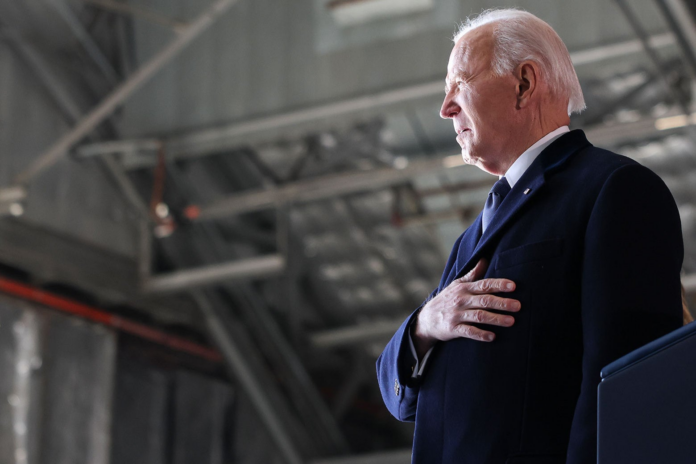Sign up for the Slatest to get the most insightful analysis, criticism, and advice out there, delivered to your inbox daily.
The end of Joe Biden’s presidency on Monday was extraordinary in many ways. Among them, nothing was more extraordinary than his use of the president’s power to grant pardons and reprieves.
Most of the clemencies Biden had granted to that point were standard in their form, coming after people were convicted of a crime, though broad in their sweep. But those he issued on his last day in office were anything but standard.
On Monday, Biden issued two sets of preemptive pardons, one for people already on President Donald Trump’s target list and another for his family members. They are a sign of the seriousness with which Biden takes his many references to Trump as an existential threat to democracy.
And they are a reminder to all of us not to let down our guard as the new administration takes office.
Alexander Hamilton, an ardent defender of the president’s ability to grant pardons and reprieves, thought that the pardon power would be used sparingly and would be especially useful in emergencies “to restore the tranquility of the commonwealth.”
Biden’s pardons signaled his conviction that we are confronting a national emergency with Donald Trump’s return to the White House. They are meant to sound the alarm about what he believes is in store for America.
Courts have long recognized that chief executives have vast and unchecked discretion in using the clemency power. Judges have said chief executives can grant pardons and commutations for “good reason, or bad reason or any reason at all.”
Advertisement
Advertisement
Advertisement
Biden seems to have taken that admonition to heart. Usually, clemency is granted after someone has been convicted of a crime, but in 1866, the United States Supreme Court gave its blessing to preemptive pardons. It made clear that the pardon power “extends to every offense known to the law and may be exercised at any time after its commission, either before legal proceedings are taken or during their pendency, or after conviction and judgment.”
Advertisement
Preemptive pardons have generally been used for public purposes of the kind Hamilton contemplated. An example of such a public purpose was George Washinton’s grants of clemency to participants in the so-called Whiskey Rebellion or Jimmy Carter’s of the Vietnam-era draft evaders.
Even Gerald Ford justified his pardon of disgraced former President Richard Nixon as a way to “preserve domestic tranquility.”
Biden’s last-day-in-office pardons were something very different. They were a concession to the breakdown of domestic tranquility and an unprecedented effort to protect their recipients from the wrath and retribution of an incoming administration.
Presidents, including Biden, have granted clemency to family members. But never before has a president been so open about favoring members of his family who have not been, and might never be, charged with a crime.
Moreover, no president has ever used the clemency power out of fear of what the next president would do to make the lives of his political opponents miserable.
The former president was hardly subtle in explaining why, first thing this morning, he chose to grant preemptive pardons to members of the Jan. 6 committee, Gen. Mark Milley, or Anthony Fauci. He called them “public servants (who) have served our nation with honor and distinction.”
Advertisement
Biden went out of his way to explain that, “The issuance of these pardons should not be mistaken as an acknowledgment that any individual engaged in any wrongdoing, nor should acceptance be misconstrued as an admission of guilt for any offense. Our nation owes these public servants a debt of gratitude for their tireless commitment to our country.”
Advertisement
And then, making his fear crystal clear, Biden said the Jan. 6 committee members and others “do not deserve to be the targets of unjustified and politically motivated prosecutions.” He restated his belief in the rule of law and his optimism “that the strength of our legal institutions will ultimately prevail over politics,” even as he acted in a way that reflected neither that belief nor that optimism.
Advertisement
Advertisement
Biden explained the disparity by noting what he called the “exceptional circumstances” and that he could not “in good conscience do nothing.”
Then he fleshed out those circumstances.
“Rather than accept accountability,” Biden continued, “those who perpetrated the January 6th attack have taken every opportunity to undermine and intimidate those who participated in the Select Committee in an attempt to rewrite history, erase the stain of January 6th for partisan gain, and seek revenge, including by threatening criminal prosecutions.”
Advertisement
With those words, the former president handed down another indictment of Trump. This one was addressed to the future.
Trump got the message loud and clear. He texted NBC’s Kristen Welker, calling Biden’s action “disgraceful” and claiming, “Many are guilty of MAJOR CRIMES!” And eschewing inaugural traditions, Trump registered his displeasure by neither thanking his predecessor nor shaking his hand during Monday morning’s ceremonies.
While Biden was at the Capitol in the run-up to those ceremonies, the other shoe dropped.
Along with commuting the life sentence of the Native American activist Leonard Peltier, who was convicted of killing two FBI agents in 1975, Biden issued a second round of preemptive pardons, as stunning as the first.
They were granted to five members of his immediate family. The recipients are his brothers and sister, James Biden, Frank Biden, and Valerie Biden Owens, and their spouses, John Owens and Sara Biden.
Advertisement
Advertisement
None of them is well known to the public. None has been a prominent critic of Trump.
That he would feel the need to protect them tells us how deeply fearful Biden is about the lengths to which Trump will go to punish any member of what Trump and his allies label the “Biden Crime Family.” In a preview of what may happen to many people and their families, the former president noted, “Even when individuals have done nothing wrong and will ultimately be exonerated … baseless and politically motivated investigations wreak havoc on the lives, safety, and financial security of targeted individuals and their families.”
“My family,” Biden concluded, “has been subjected to unrelenting attacks and threats, motivated solely by a desire to hurt me—the worst kind of partisan politics. Unfortunately, I have no reason to believe these attacks will end.”
And neither should we.
Too bad the former president could not protect the rest of us from what is to come.



